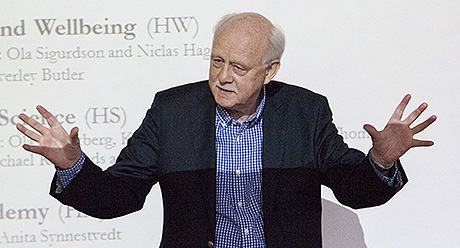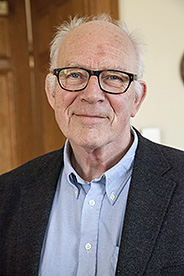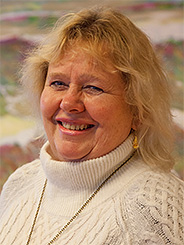 Professor Kristian Kristiansen, director of the new center. Photo: Anders Simonsen.
Professor Kristian Kristiansen, director of the new center. Photo: Anders Simonsen.
On the 21st of April, the newly established Centre for Critical Heritage Studies (CCHS) was launched ceremoniously at the University of Gothenburg. An important goal for the center is to study how cultural heritage are perceived and used in different arenas today. The research aims to provide critical alternatives for the future.
 − I am very optimistic and grateful that the University of Gothenburg has chosen to invest in critical heritage research. The center will work as a global platform for diverse approaches to the study of heritage, says Michael Rowlands, professor emeritus in anthropology and archaeology at University College London (UCL), and one of the leaders of the new center, who held the key note speech at the launch.
− I am very optimistic and grateful that the University of Gothenburg has chosen to invest in critical heritage research. The center will work as a global platform for diverse approaches to the study of heritage, says Michael Rowlands, professor emeritus in anthropology and archaeology at University College London (UCL), and one of the leaders of the new center, who held the key note speech at the launch.
Centre for Critical Heritage Studies is part of the University of Gothenburg's cross-disciplinary research initiative UGOT Global Challenges where six new centers received funding to establish multidisciplinary research centers focusing on global societal challenges, starting in April 2016. This center is formed as collaboration between University of Gothenburg and University College London.
Centre for Critical Heritage Studies is organized in four research clusters that gather different forms of global societal challenges connected to heritage in the past, the present and the future.
− The last 10-15 years, different groups in society have put a renewed focus on heritage, and with it new forms of cultural heritage emerged paralleled with old forms resurfacing. The latter applies archives and digital humanities, while the urban space and health are new forms of cultural heritage, as well as recycling and vintage, says Kristian Kristiansen, professor in archaeology and director of the center.
A theme that will be developed within the center focus on studying heritage by applying new forms of scientific methods as for example DNA sequencing and network analysis. Yet another part of the centers organization is the Heritage Academy that is a network between the university, heritage institutions, politics and business.
 − My mission is to create a platform where different culture and memory institutions, the University of Gothenburg and the Västra Götaland region can meet. It will support the development of knowledge in universities and cultural institutions, and contribute to the interaction between theory and practice. The main activity consists of seminars, conferences and training, says Anita Synnestvedt.
− My mission is to create a platform where different culture and memory institutions, the University of Gothenburg and the Västra Götaland region can meet. It will support the development of knowledge in universities and cultural institutions, and contribute to the interaction between theory and practice. The main activity consists of seminars, conferences and training, says Anita Synnestvedt.
What role will this center play?
− I hope it will mean that research on heritage and its various processes will be developed and deepened, which is needed in our globalized world. We face many challenges where discussions and research on heritage can be of great importance. The center can thus also participate with a critical perspective in a contemporary debate and in the community on issues related to heritage, says Anita Synnestvedt.
Read more about the CCHS at their webpage.

 − I am very optimistic and grateful that the University of Gothenburg has chosen to invest in critical heritage research. The center will work as a global platform for diverse approaches to the study of heritage, says Michael Rowlands, professor emeritus in anthropology and archaeology at University College London (UCL), and one of the leaders of the new center, who held the key note speech at the launch.
− I am very optimistic and grateful that the University of Gothenburg has chosen to invest in critical heritage research. The center will work as a global platform for diverse approaches to the study of heritage, says Michael Rowlands, professor emeritus in anthropology and archaeology at University College London (UCL), and one of the leaders of the new center, who held the key note speech at the launch. − My mission is to create a platform where different culture and memory institutions, the University of Gothenburg and the Västra Götaland region can meet. It will support the development of knowledge in universities and cultural institutions, and contribute to the interaction between theory and practice. The main activity consists of seminars, conferences and training, says Anita Synnestvedt.
− My mission is to create a platform where different culture and memory institutions, the University of Gothenburg and the Västra Götaland region can meet. It will support the development of knowledge in universities and cultural institutions, and contribute to the interaction between theory and practice. The main activity consists of seminars, conferences and training, says Anita Synnestvedt.